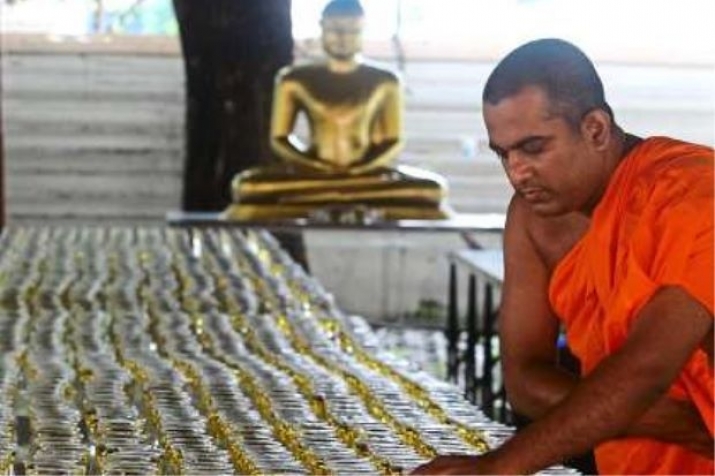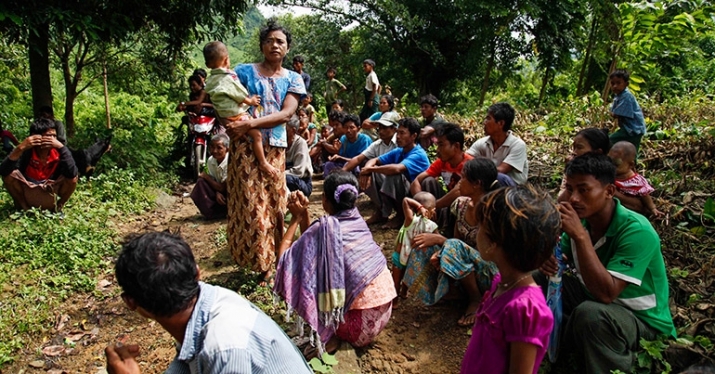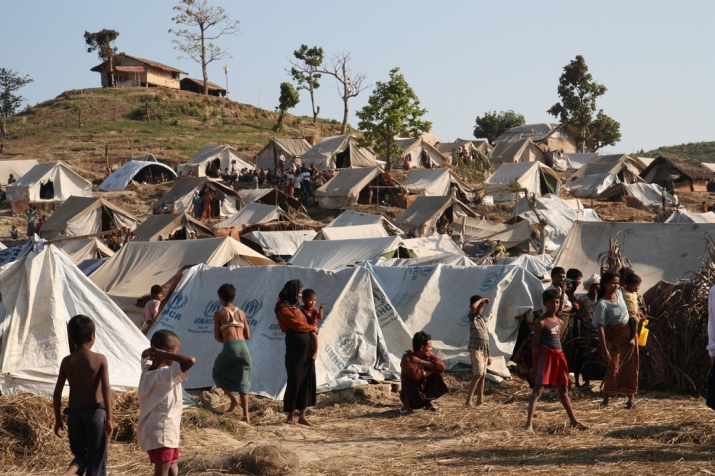NEWS
Senior Malaysian Monk Condemns Anti-Muslim Violence in Myanmar
 Venerable Dr. K. Sri Dhammananda arranges oil lamps at the Buddhist Maha Vihara Temple in Kuala Lumpur. From thestar.com.my
Venerable Dr. K. Sri Dhammananda arranges oil lamps at the Buddhist Maha Vihara Temple in Kuala Lumpur. From thestar.com.myMalaysia’s most senior Buddhist monk has spoken out against the escalating violence toward Myanmar’s Rohingya Muslim minority, emphasizing that such action is in direct contradiction to Buddhist teachings. Venerable Dr. K. Sri Dhammaratana Nayaka Maha Thero, the chief sangha nayaka of Malaysia and abbot of the 121-year-old Buddhist Maha Vihara in Kuala Lumpur, observed that genuine Buddhist monks would never condone violence, which runs against the fundamental principles of Buddhism.
Unrest has been escalating in recent weeks in Buddhist-majority Myanmar’s strife-torn northern Rakhine State, where the United Nations reports that as many as 30,000 people have been displaced by renewed violence. Security forces in the volatile region recently launched an aggressive crackdown in response to deadly attacks on 9 October on guard posts near the Myanmar’s border with Bangladesh, in which nine police were killed. Myanmar’s military has reportedly killed dozens of people and arrested scores more in their hunt for the perpetrators, who the government says are Rohingya militants. The action has been accompanied by reports of widespread human rights abuses.
“Sometimes people use bogus monks for political reasons,” Ven. Dhammaratana said when asked to comment on radicalized monastics in Myanmar who have stoked religious division by asserting that Myanmar’s Buddhist population and culture is under threat from Islam. “They let them wear the [Buddhist monk’s saffron] robe, and do things that genuine monks would never do. Violence is never encouraged in Buddhism. We are not supposed to kill living things, including animals.” (The Star Online)
 Villagers gather in the jungle as they flee violence near the Bangladesh-Myanmar border in Rakhine State. Photo by Nyunt Win. From sea-globe.com
Villagers gather in the jungle as they flee violence near the Bangladesh-Myanmar border in Rakhine State. Photo by Nyunt Win. From sea-globe.comReligious tensions between Buddhists and Muslims have simmered in Myanmar for almost half a century, but came to a head with violent clashes in 2012 that killed more than 100 people. Rakhine State is one of the most sensitive and conflict-prone regions in Myanmar, particularly since outbreaks of anti-Muslim violence in 2012 and 2013, following which 140,000 people, most of them Rohingya Muslims, were displaced. Most Rohingya remain in squalid resettlement camps where they are subject to severe restrictions, with limited access to education, healthcare, or employment opportunities.
“The problem in the area stem from human weakness. It was a personal matter that escalated into misconceived religious clash,” noted Ven. Dhammaratana, who said he had visited Rakhine State three years ago. “It is being wrongly presented to the world as a religious issue. It has nothing to do with religion. It is caused by human weakness.” (The Star Online)
Reiterating that Buddhism teaches that it is wrong to harm, torture, or kill others, Ven. Dhammaratana called on all concerned parties to engage with one another peacefully as soon as possible and to seek a peaceful solution through dialogue. “Otherwise the image of Buddhism would be tarnished,” he added. (The Star Online)
 A camp for displaced Rohingya Muslims in Myanmar's Rakhine State. From globalriskinsights.com
A camp for displaced Rohingya Muslims in Myanmar's Rakhine State. From globalriskinsights.comMyanmar classifies Rohingya Muslims as stateless foreign migrants although they have lived in Myanmar for generations. The country’s population also includes Muslims from other ethnic groups. According to the Washington, DC-based Pew Research Center, Buddhists make up about 80 per cent of Myanmar’s population of some 52 million, and Muslims just 4 per cent.
The radical nationalist Committee for the Protection of Nationality and Religion (Ma Ba Tha), a collective of hardline Buddhist abbots and influential monks founded in 2013, have actively fueled religious divisions in Myanmar, especially towards the Rohingya minority. However, major figures from Myanmar’s mainstream political and religious communities, including the State Sangha Maha Nayaka Committee of the country’s most senior monks, have publically spoken out against Ma Ba Tha, saying the group’s policies are not representative of the country’s Buddhist sangha, which has some 250,000 members according to a government estimate, and do not reflect the essence of Buddhism.
See more
Chief priest: Genuine monks do not condone violence (The Star Online)
Related news from Buddhistdoor Global
Buddhist Aid Workers in Myanmar’s Troubled Rakhine State Risking Public Censure
Buddhist Hardliners Protest Annan’s Visit to Myanmar’s Troubled Rakhine State
Myanmar Picks Former UN Chief Kofi Annan to Head Buddhist-Muslim Rakhine Commission
Myanmar to Form Buddhist-Muslim Commission to Address Humanitarian Crisis in Rakhine State
Top Buddhist Authority in Myanmar Begins Moving Against Extremist Buddhist Organizations
Aung San Suu Kyi to Lead Peace Effort in Rakhine Against Backdrop of Political Complications
Lone Buddhist Reaches Out to Rohingya Children in Myanmar
Aung San Suu Kyi Urges Tolerance and Unity in Myanmar’s Troubled Rakhine State
Related features from Buddhistdoor Global
Buddhistdoor View: Shelter for the Weary and Dispossessed amid the Refugee Crisis
Buddhistdoor View: Letting Go of Extremism: The Middle Way














